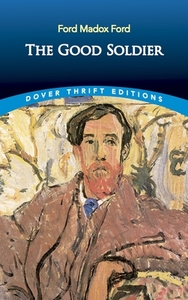Take a photo of a barcode or cover
medium-paced
Plot or Character Driven:
Character
Strong character development:
No
Loveable characters:
No
Diverse cast of characters:
No
Flaws of characters a main focus:
Yes
emotional
inspiring
mysterious
reflective
sad
medium-paced
Plot or Character Driven:
Character
Strong character development:
Complicated
Loveable characters:
Complicated
Diverse cast of characters:
Yes
Flaws of characters a main focus:
Complicated
Moderate: Suicidal thoughts, Suicide, Suicide attempt
I hadn't read this since my university days, some forty years ago; although I didn't recall all of the details, I have to say the technique and brilliance of the writing remained with me and I loved it just as much this time as I did all those years ago. Having spent the last twenty some years teaching literature, and having explained many times the progression of fiction from nineteenth-century realism to Post WWI Modernism, I will go out on a limb here and say that The Good Soldier is the quintessential Modernist narrative, maybe not better than, but a slightly better example of the Modernist novel than The Great Gatsby.
While both novels feature the semi-attached, first person narrator in place of the nineteenth-century omniscient voice, The Good Soldier prefaces the later flexibility with time and narration that becomes an earmark of Modernism. Gatsby, for all its grace and beauty, as I recall, is pretty linear and chronological. Much of the joy of reading The Good Soldier, however, is how our narrator circles around his story, revealing it out of order, criss-scorring his own tracks, changing his mind, and going deeper into the truth of it, without sticking to a strict chronology. Great stuff.
The other thing I really love about The Good Soldier is how it's both a really sad story (although our narrator proclaims it too petty to be a real tragedy) and rather funny--not by turns but rather at the same time and for almost the same reasons. Standard human self interest and our laughably tragic inability to be other than what we are, petty and insignificant as that is for most of us, kept me both pitying and laughing at the characters. We are tawdry beings for the most part born to live the same old experiences of most of our peers, wallowing in life like pigs, as if our experiences were in any way unique or not altogether predictable. Nevertheless, they are, tragically, all that we have. We are deadly serious and utterly risible most of the time and I can think of no other novel that shows both of these attitudes toward life so well. (Oddly, the only other work of art that I can think of that both scares and makes me laugh at the same time is David Lynch's film Eraserhead. It uses totally different techniques, but somehow also captures the laughable absurdity and horrific reality of life, desire, and our semi-codified human interactions.)
My one grouse about the novel is that Ford does not pull off the narrator's Americanness. This is a lesson to me as I recently wrote a short story with a British, female narrator. Reading The Good Soldier, I discovered that it's not enough to add a Britishism here and there, one also has to excise one's Americanisms in order to sound British. While Ford added a distinctly American phrase or attitude here and there, by failing to take out the many, many British usages, phrases, adages, and attitudes, the narrator comes off as a pastiche of the two nationalities. Doesn't matter much overall, but it bugged me he hadn't done better, given how great the writing is otherwise.
While both novels feature the semi-attached, first person narrator in place of the nineteenth-century omniscient voice, The Good Soldier prefaces the later flexibility with time and narration that becomes an earmark of Modernism. Gatsby, for all its grace and beauty, as I recall, is pretty linear and chronological. Much of the joy of reading The Good Soldier, however, is how our narrator circles around his story, revealing it out of order, criss-scorring his own tracks, changing his mind, and going deeper into the truth of it, without sticking to a strict chronology. Great stuff.
The other thing I really love about The Good Soldier is how it's both a really sad story (although our narrator proclaims it too petty to be a real tragedy) and rather funny--not by turns but rather at the same time and for almost the same reasons. Standard human self interest and our laughably tragic inability to be other than what we are, petty and insignificant as that is for most of us, kept me both pitying and laughing at the characters. We are tawdry beings for the most part born to live the same old experiences of most of our peers, wallowing in life like pigs, as if our experiences were in any way unique or not altogether predictable. Nevertheless, they are, tragically, all that we have. We are deadly serious and utterly risible most of the time and I can think of no other novel that shows both of these attitudes toward life so well. (Oddly, the only other work of art that I can think of that both scares and makes me laugh at the same time is David Lynch's film Eraserhead. It uses totally different techniques, but somehow also captures the laughable absurdity and horrific reality of life, desire, and our semi-codified human interactions.)
My one grouse about the novel is that Ford does not pull off the narrator's Americanness. This is a lesson to me as I recently wrote a short story with a British, female narrator. Reading The Good Soldier, I discovered that it's not enough to add a Britishism here and there, one also has to excise one's Americanisms in order to sound British. While Ford added a distinctly American phrase or attitude here and there, by failing to take out the many, many British usages, phrases, adages, and attitudes, the narrator comes off as a pastiche of the two nationalities. Doesn't matter much overall, but it bugged me he hadn't done better, given how great the writing is otherwise.
The weird thing about this book is I rated it pretty high when I finished it internally in my head. But when I decided to add all these books to Goodreads, I remembered that I gave it a 4.25 (don't even get started with me about the lack of half stars on Goodreads), but I didn't remember a single thing about the book.
It's weird because this book is a rollercoaster, with wild narratives, crazed characters and a truly haunting textual reading. After refreshing my mind on Wikipedia, I instantly remember the twists and turns and the spoiler:. I remember reading this book and thinking how fascinating it all was, but about a year later, forgot everything about it entirely. Maybe it's not the best way to judge things, but I think that the lack of long term impact says something to dock down to 4.25 out of 5.
It's weird because this book is a rollercoaster, with wild narratives, crazed characters and a truly haunting textual reading. After refreshing my mind on Wikipedia, I instantly remember the twists and turns and the spoiler:
Spoiler
the increasing likelihood that Dowell is more monster than victim caught in the crossfire
Hmm I read that this book was supposedly one of the greats books ever written. Hahaha that’s funny tell me another one. It was good great no I think not but if your an hypocritical old white guy in 1915 adultery is very titillating concept and most partook of it especially in the upper echelons of British society. It was an ok read would not be on my list to recommend.
emotional
reflective
slow-paced
Plot or Character Driven:
Character
Strong character development:
No
Loveable characters:
Complicated
Diverse cast of characters:
No
Flaws of characters a main focus:
Yes
THERE IS SO MUCH IN THIS. Such an odd, unreliable narrative, so much ommission, so many flashbacks and going back and forth between characters and events.. But therefore also very intriguing. Imma write my essay about this one. Ford, I approve. Ur good, dude.
emotional
Some passages with really beautiful language, but overall I did not find the characters sympathetic or interesting.






